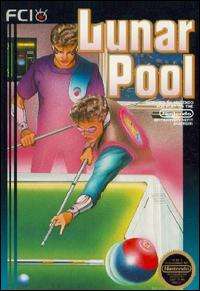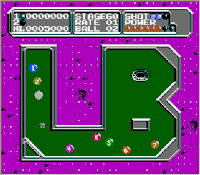Lunar Pool
Lunar Pool (known as Lunar Ball (ルナーボール, Runā Bōru) in Japan) is a video game that combines pool (pocket billiards) with aspects of miniature golf, created and developed by Compile for the Nintendo Entertainment System and MSX, in which each stage is a differently shaped pool table. The object is to knock each ball into a pocket using a cue ball. There are sixty levels to choose from, and the friction of the table is adjustable (thus the lunar reference in the title, along with Moon-related background imagery within the game).
| Lunar Pool | |
|---|---|
 Box cover of Lunar Pool for the NES | |
| Developer(s) | Compile |
| Publisher(s) | Ponyca (Japan) FCI (North America) |
| Composer(s) | Masatomo Miyamoto |
| Platform(s) | PC-8800 series, NES, MSX, Virtual Console |
| Release | PC-88
Virtual Console |
| Genre(s) | Cue sports game |
| Mode(s) | Single-player, multiplayer |
The Japanese Lunar Ball appeared on Famicom clone systems and pirated multi-game cartridges, such as the Power Player Super Joy III. It was released for the Wii on the North American Virtual Console on October 22, 2007.
Gameplay
Lunar Pool is played in boards of different shapes, wherein the player has to shoot the cue ball to knock other colored balls into the pockets. If the player fails to pocket at least one colored ball in three consecutive turns, then the player will lose one life. Also, if the player pockets his own cue ball, he loses a life.

If a player pockets all the colored balls in a level consecutively without failure, the player will get a "Perfect!" remark, and bonus points will be added to the player's score.
Modes
Lunar Pool can either be played alone, against another player, or against the computer. If the game is played against another player or the computer, players take turns shooting the cue ball. If one player fails to knock at least one of the colored balls into a pocket, or pockets their own cue ball, then it will be the opponent's turn.